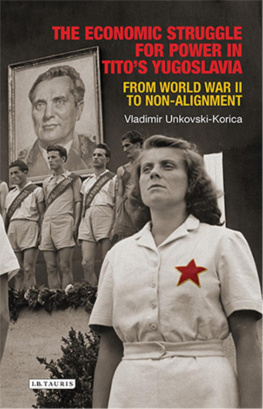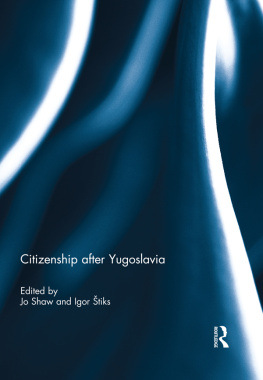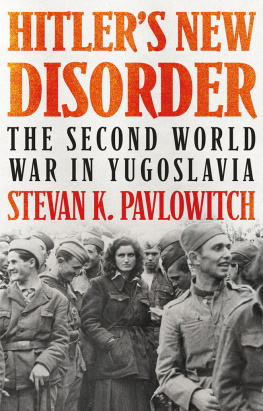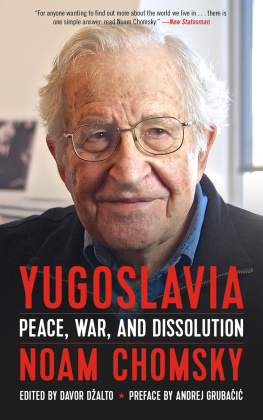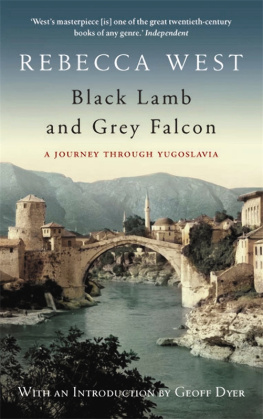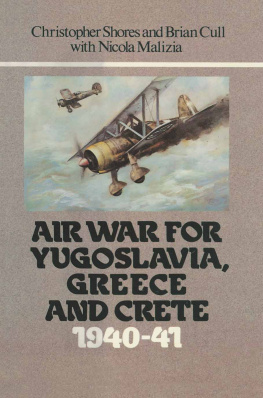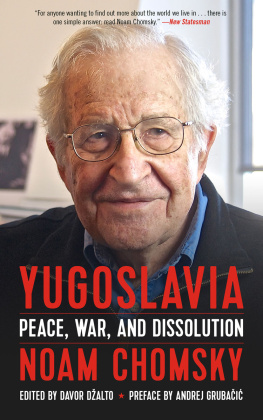First published 1985 by Westview Press
Published 2019 by Routledge
52 Vanderbilt Avenue, New York, NY 10017
2 Park Square, Milton Park, Abingdon, Oxon OX14 4RN
Routledge is an imprint of the Taylor & Francis Group, an informa business
Nora Beloff 1985
All rights reserved. No part of this book may be reprinted or reproduced or utilised in any form or by any electronic, mechanical, or other means, now known or hereafter invented, including photocopying and recording, or in any information storage or retrieval system, without permission in writing from the publishers.
Notice:
Product or corporate names may be trademarks or registered trademarks, and are used only for identification and explanation without intent to infringe.
Photoset in Great Britain by
Rowland Phototypesetting Ltd, Bury St Edmunds, Suffolk
ISBN 13: 978-0-813-30322-2 (hbk)
THE REPRESSIVE NATURE of the Communist system in Yugoslavia debars me from expressing my personal thanks to the large number of Yugoslavs, particularly the young, who have helped me during the years I have spent working on this reassessment. If the book can be smuggled through to them I hope that they will accept this collective acknowledgement of my debtall the greater because they took risks and I took none.
One of the deprivations which the present regime has inflicted on Yugoslav society is the exodus of many of the ablest and most uncompromising of its intellectuals: thus qualifying these for the pejorative label of migr and exposing them to scorn and hatred. Yugoslavia's loss has been my gain: two scholars, Dr Ljubo Sirc of the Department of Political Economy at Glasgow University and Dr Stevan Pavlowitch of the Faculty of History at Southampton fit into this category. Both have been unstintingly generous with their time and erudition and this book could not have been written without their help.
My special thanks are also due to the international lawyer, Professor Ivo Lapenna, who has helped me to understand why any Yugolsav who, like himself, respects the independence of the judiciary, cannot practise his profession in his own country. I have also been helped and advised by Mr Aleksa Djilas who has inherited the intransigence of his father Milovan, the only man in a Communist-led country who after reaching the highest echelons of the Party and enjoying all the perks of the nomenklatura, ever willingly resigned on a matter of principle. Aleksa has campaigned steadfastly for human rights and for the observance of the Helsinki Agreement by Yugoslavia, consequently being forced to seek political asylum, conceded to him by the British Government in 1983.
I am especially grateful to the Hoover Institution of Stanford University, California, for inviting me to be a Visiting Scholar and for giving me access to their fine libraries and archives. I am personally indebted to its Chief Archivist, Dr Milorad Drachkovitch who allowed me to draw on his encyclopaedic knowledge of Yugoslav history. I must also thank Mr Irving Kristol, a member of the Board of Directors of the Institution for Educational Affairs, through whose good offices I received a grant which covered part of the costs of the frequent visits to Yugoslavia which this work has entailed.
Those of my compatriots who helped me most were the ones who served in Yugoslavia during the war and who opened up a new perspective on the internecine fighting going on between the Yugoslavs themselves and revealed to me for the first time that we had actively intervened in the civil war on the Partisan side. The most important information was from Colonel Hudson who was in Yugoslavia from 1941 to 1944 and from Robert Wade who introduced me to Hudson and who like Hudson was sent to join the anti-Communist Draa Mihailovi guerrilla force and then given orders to change sides and join the Partisans.
I am much indebted for useful criticism and suggestions to Sir Alexander Glen, who as junior naval attach in Belgrade had known Mihailovi before Yugoslavia entered the war and who was serving with the Partisans when the Russians arrived in east Serbia in 1944. Another British officer, Mr Vane Ivanovi, of Yugoslav extraction, who served with British Intelligence in Cairo and Bari, understood better than most of his colleagues what was really happening in Yugoslavia and has been a valuable critic and adviser.
I would like to pay a special tribute, alas posthumous, to George Waddams who served with the Partisans in Slovenia and, at the end of the war, was appointed British Consul in Ljubljana. Before he died he described to me his unavailing efforts to alert and inform the British government and British opinion of the magnitude of the postwar terror in Yugoslavia, a lot of it directed against friends of Britain.
On the academic side I owe thanks first to the late Professor Hugh Seton-Watson on whose writings and comments I heavily relied. I am also indebted to two scholars with intimate knowledge ofYugoslav cultural and spiritual life, Mrs Celia Hawksworth and Mrs Stella Alexander, My older brother, Professor Max Beloff who, unlike me, is a professional historian, generously read and corrected the chapters as they were written. Neither he nor any of the people I have mentioned in this preface are in any way responsible for the contents of the booknor for its mistakes.
I owe a special word of thanks to my husband Clifford Makins to whom this book is dedicated and who helped and encouraged me in what has been by far the most arduous and challenging assignment of my professional life. For too long he has had to share my time and attention with the unlaid ghost of Marshal Tito.
This book is in part a penance for unquestioningly accepting the Titoist bias shared by most of my countrymen. I hope it may be regarded in part as the damages I owe to the many victims of Yugoslav police repression, not least the six Belgrade intellectuals who were on trial for their opinion when I was struggling to complete the book. For one of the newspapers which took the lead in sustaining the Titoist myth was The Observer on which I spent most of my adult life. Fortunately I had resigned before Tito's funeral when The Observer's editorial staff laid a wreath paying homage to "a great leader". They were as unaware as I used to be that if they had been writers in Yugoslavia and had had the courage of their personal convictions (which presumably include a belief in civil rights), they would either have had to emigrate or to live dangerously outside the law, unemployed and without the dole.
It seems hardly necessary to say, except perhaps for the benefit of the more primitive Yugoslav Communists who believe that the British are their "class enemies", that this book is not officially inspired. On the contrary, it is likely to displease the top people (though not everybody) at the Foreign and Commonwealth Office, the State Department and, perhaps, the Quai d'Orsay.


